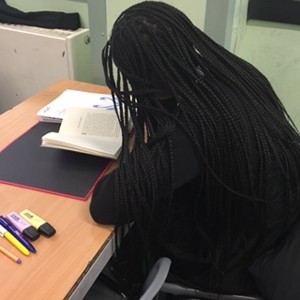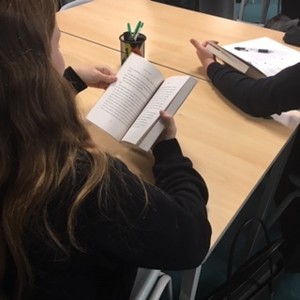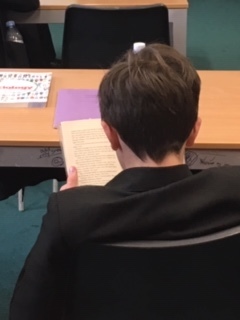- Home
- Parents & Carers
- Latest News
- Flash Reading
Latest News
Flash Reading
Posted on: 15/10/2019

“The more that you read, the more things you will know. The more that you learn, the more places you will go.” Dr Seuss.
There is no doubt that here at Bishop Justus this statement represents a core belief. The power of books is undeniable and we continuously discuss the need to get more students to read for pleasure. Consequently, on Thursday 3rd October, the entire school was involved in a Flash Read event, when everyone in the building dropped everything and read for twenty minutes.
This was a truly positive experience, with both teachers and many students commenting on the fact that they enjoyed the experience and relished the opportunity to slow down and simply enjoy a good book. This enjoyment could be seen in the many faces that emerged at lunchtime out of the classrooms and the buzz from both students and teachers alike was palpable with students and teachers discussing the books they were currently reading.
Studies show that there is a positive correlation between reading for pleasure and attainment. Findings from the National Literacy Trusts 2013 annual survey revealed that 27.9% of students who reportedly read every day, achieved above expected level. Whereas, only 7.3% of students who read about once a month achieved above expected level. According to one source, if you read for twenty minutes a day you’ll encounter an estimated 1,800,000 words whereas reading for only one minute a day will result in only 8,000 words. With this in mind, we have developed our Eager Reader programme where students in Key Stage 3 are given a reading hour, once a fortnight where they are expected to read for part of the lesson, they are then given the opportunity to discuss what they have read and finally they complete a book review. Students are able to choose their own book for one term and then in the following term a book is chosen for them, this is because we place a high value on reading books that are both enjoyable but also help to move students on in their reading.
Promoting reading across the school supports the school’s focus on developing students’ literacy which is key to learning across all subjects and is a strong predictor of outcomes in later life. Alongside this, teachers across the school are providing explicit vocabulary instruction to help students access and use academic language. This involves discussing the etymology and morphology of words, which will help students remember new words and make connections between words. Teachers are also prioritising the teaching of Tier 2 and Tier 3 vocabulary, which are words that students are unlikely to encounter in everyday speech. Tier 2 words present challenges to students who primarily meet them in print. Examples of Tier 2 words are obvious, complex, establish and verify. Tier 3 Words are words that are not frequently used except in specific Subject areas. Tier 3 words are central to building knowledge and conceptual understanding within the various subjects and are integral to teaching in these areas. For example, economics, isotope, asphalt, Revolutionary War, and crepe are all examples of these words.
It is clear that reading helps students gain knowledge, which leads to better writing, whilst writing can deepen students’ understanding of ideas. There are plans to continue to encourage reading across the school and parents are asked to support this by ensuring that their young person reads for at least 20 minutes every night. Students should be encouraged to read a range of texts from newspapers, to fiction and non-fiction texts. Books should be discussed continuously; this will inevitably lead to improved outcomes for each of our students.
by Ms Amosu - Teaching and Learning



